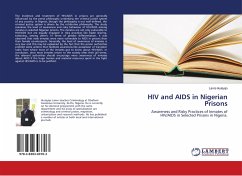
HIV and AIDS in Nigerian Prisons
Awareness and Risky Practices of Inmates of HIV/AIDS in Selected Prisons in Nigeria.
Versandkostenfrei!
Versandfertig in 6-10 Tagen
32,99 €
inkl. MwSt.

PAYBACK Punkte
16 °P sammeln!
The incidence and treatment of HIV/AIDS in prisons are generally influenced by the penal philosophy underlying the criminal justice system of any country. In Nigeria, though the philosophy is not well defined, the criminal justice system is driven by the retributive philosophy. The study examines the level of awareness and risky behaviour of HIV/AIDS among inmates in selected Nigerian prisons. The inmates are not only vulnerable to HIV/AIDS but are equally engaged in risky practices like blade sharing, tattooing, among others. In terms of gender differentiation, it was observed that male inmat...
The incidence and treatment of HIV/AIDS in prisons are generally influenced by the penal philosophy underlying the criminal justice system of any country. In Nigeria, though the philosophy is not well defined, the criminal justice system is driven by the retributive philosophy. The study examines the level of awareness and risky behaviour of HIV/AIDS among inmates in selected Nigerian prisons. The inmates are not only vulnerable to HIV/AIDS but are equally engaged in risky practices like blade sharing, tattooing, among others. In terms of gender differentiation, it was observed that male inmates were more vulnerable to AIDS in prisons than their female counterparts. Generally, the level of awareness of inmates is very low and this may be explained by the fact that the prison authorities prohibit some actions that facilitate awareness like possession of transistor radio from where most of the inmates got to know about HIV/AIDS. In conclusion, since most inmates return to the society after their jail terms, the relevant authorities should encourage more awareness of inmates about AIDS if the huge human and material resources spent in the fight against HIV/AIDS is to be justified.












